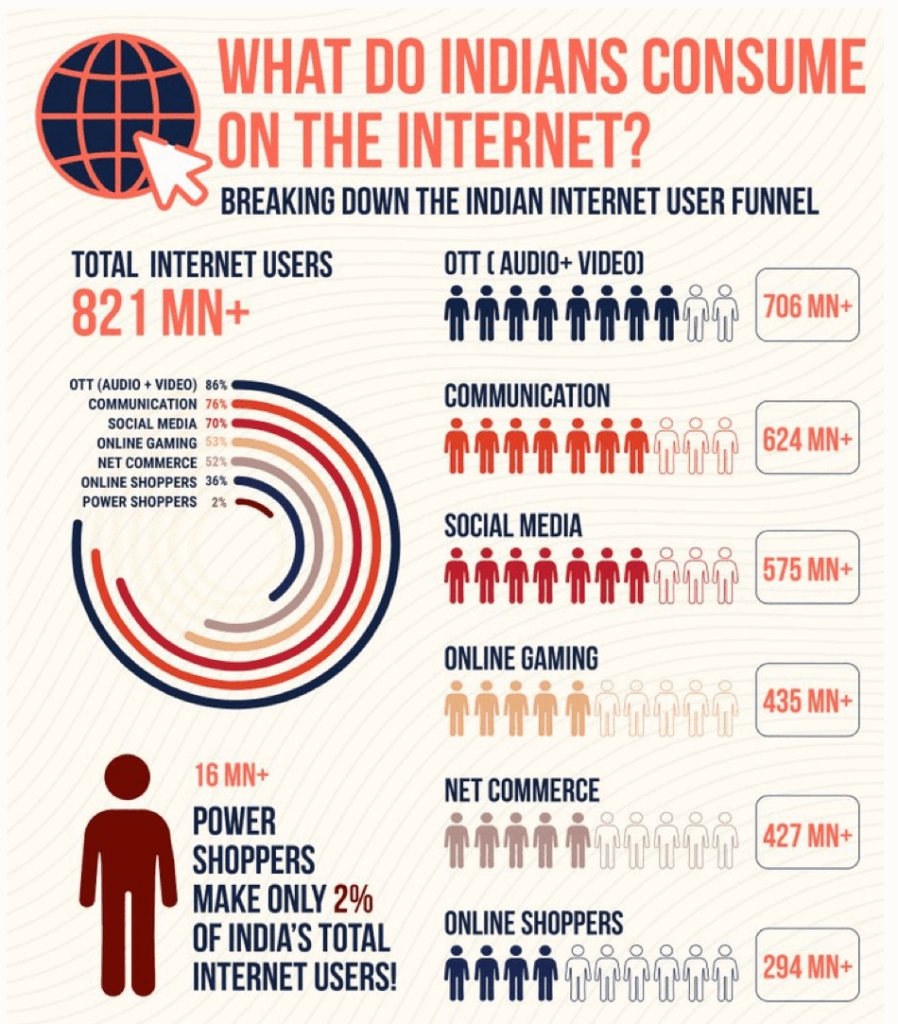India’s digital transformation has been one of the most significant global stories of the past decade. With over 820 million internet users, the country has emerged as a digital-native economy, despite having a GDP per capita of just over $2,700. While many countries transitioned gradually from desktops to smartphones, India skipped a few steps—embracing mobile-first access from the start.
This shift isn’t just about personal connectivity—it’s reshaping how industries operate, especially the business events sector. To stay relevant and future-ready, industry players must understand the implications of India’s digital adoption and build strategies around it.
The Reality of a Mobile-First Nation
India’s digital growth is powered by affordable smartphones and low-cost data plans, making internet access more democratic and widespread.
- 820+ million internet users (2024 est.)
- Majority of users access the internet primarily via smartphones
- Desktop and laptop ownership remains low in many regions
- Digital literacy is growing beyond urban centers into Tier 2 and Tier 3 cities
This has created an environment where digital content, platforms, and tools are more relevant than traditional, hardware-intensive solutions.

Why This Matters for the Events Industry
The nature of India’s digital access changes how audiences engage with content and events. Traditional formats no longer suffice. Instead, digital-first strategies must become central to event planning, marketing, and execution.
Here are three key ways the business events industry can evolve:
1. Organisers: Go Digital to Go Far
Event organisers must think beyond the physical venue. With millions of people accessing content via mobile phones, the potential reach is enormous—if content is tailored and distributed effectively.
- Leverage AI-driven content tools to personalize event marketing
- Use social media platforms to engage rural and remote participants
- Offer mobile-optimized registration, agenda browsing, and networking tools
- Use short-form video, reels, and interactive stories to highlight key moments in real time
2. Venues: Infrastructure Must Be Digital-Ready
Modern venues must support more than Wi-Fi. They need to enable seamless content creation, hybrid streaming, and sustainable practices powered by digital infrastructure.
Must-Have Infrastructure:
- High-speed, reliable internet
- On-site content production zones for livestreams, podcasts, and social media updates
- Smart energy and waste management systems to support net-zero goals
- Real-time analytics tools to monitor attendee behavior and preferences
3. Vendors: Bridging the Digital Divide
Vendors—whether tech providers, production partners, or logistics firms—play a crucial role in helping organisers and venues bridge the digital gap.
- Provide plug-and-play tech tools for virtual and hybrid events
- Offer affordable, scalable solutions for Tier 2/3 markets
- Partner on training and onboarding of staff and volunteers
- Innovate with immersive formats—AR/VR booths, AI-led networking, virtual walkthroughs
A Call for Digital Inclusivity and Sustainability
To build an inclusive, sustainable events industry in India, stakeholders must experiment with digital technologies at every level—from promotion and operations to post-event analysis.
Future-Focused Principles:
- Prioritize digital access over physical scale
- Build experiences for mobile-first audiences
- Integrate sustainability goals with digital tools (paperless badges, online surveys, smart logistics)
- Promote co-learning between traditional players and new-age startups
India’s digital-first population presents an incredible opportunity—but only for those prepared to adapt. Organisers, venues, and vendors must rethink their roles and responsibilities in a mobile-led world. By embracing digital tools, supporting inclusive infrastructure, and prioritizing sustainability, the business events industry can truly evolve to serve India’s next billion internet users.
As digital connectivity becomes central to every industry, Internet Service Providers must modernize how they operate.
Jaze ISP Manager helps ISPs manage their broadband business with ease—offering automated customer support, real-time network monitoring, intelligent fault detection, and direct revenue sharing between franchises. It’s a complete solution designed to improve reliability, simplify operations, and support scale, especially in mobile-first markets like India.
Click here to know more.






